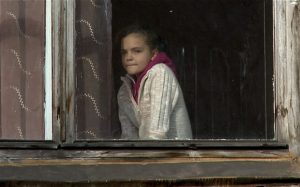
 “I don’t think it will be as dirty there” says eleven-year old Masha, when asked how she feels about being adopted by an American couple and moving to Wisconsin. Masha has lived in a Russian orphanage during most of her life and is in the process of being adopted by Claudio and Cheryl Diaz, who will also adopt five-year old twins Marcel and Vadim, finally realizing their dream of giving their biological daughter Cami a big family. Preoccupied with how the inclusion of three new members might disrupt their family’s structure, the Diaz’s work with developmental psychologist Dr. Robert Marvin who studies whether love is something that can be learned.
“I don’t think it will be as dirty there” says eleven-year old Masha, when asked how she feels about being adopted by an American couple and moving to Wisconsin. Masha has lived in a Russian orphanage during most of her life and is in the process of being adopted by Claudio and Cheryl Diaz, who will also adopt five-year old twins Marcel and Vadim, finally realizing their dream of giving their biological daughter Cami a big family. Preoccupied with how the inclusion of three new members might disrupt their family’s structure, the Diaz’s work with developmental psychologist Dr. Robert Marvin who studies whether love is something that can be learned.
What follows is a year-long chronicle in which filmmaker Sarah McCarthy follows the newly expanded family as they learn how to adapt and move beyond linguistic, cultural and emotional barriers in order to form the “Disney family” the Diaz’s dream of becoming. As in the best nonfiction films, McCarthy’s camera captures human behavior at its rawest, especially when the subjects don’t know they are being watched. For example as we watch the introverted Masha bloom while she practically usurps Cami’s reign, we are reminded of a scene in which the latter addresses the camera proclaiming her maturity and role as older sister by exclaiming “I’m not really daddy’s little girl”, however she does this as she holds a plush animal.
The power dynamics within the family change quickly as Masha and the twins develop a close relationship with Claudio, neglecting or downright antagonizing Cheryl and Cami. McCarthy does a terrific job in stressings dramatic moments while allowing these individuals to flourish as characters. Masha, who looks like she would’ve been a child star in classic Hollywood, brings a shy tenderness to the film that make us root for her even when she’s throwing passive aggressive tantrums, while the twins are comedic sidekicks for the ages, “he’s my brother and I’m the only one who can insult him” says little Vadim about his brother, before suggesting that now they live in America they should be renamed Chocolate and Coconut.
Analyzing this moving film within the historical context (especially after Vladimir Putin banned foreign adoptions of Russian children) provides us with a heartbreaking dilemma as we begin to wonder what exactly is the optimal environment for this children to develop in and whether they will be able to learn how to love these strangers who, for better or for worse, took them away from the only place they knew as home.
“The Dark Matter of Love” makes its NYC debut at DOC NYC on Nov 17 @ 4:45 PM at the IFC Center. A second showing will be on Nov 18 @ 01:00 PM. Click here for more information and tickets.